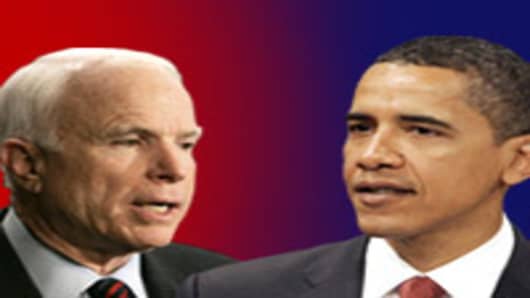Strategas analysts sized up potential stock market winners and losers depending on which candidate wins the White House in November, and the results may not be as different as you might think. The analysts also came up with two most "out of consensus calls" if the Democrats sweep Congress on election day.
The first is pro tobacco, and the favorite stock is Altria. This is
because both Democrat Sen. Barack Obama and Republican Sen. John McCain favor regulation of the industry by the Food and Drug Administration.
With a federal regulator, Altria would be shielded from some litigation. The legislation also restricts marketing of tobacco products which would help Altria preserve its 50 percent market share and cut advertising costs. Altria is also unlikely to cut its dividend in response to a dividend tax increase, but there would be risks in possible new state and federal taxes on tobacco.
U.S. Steeland International Paper could also be winners. The analysts expect Democratic trade policy to be far different than what is being talked about on the campaign trail. They believe the Democrats would try to use the World Trade Organization process to stop foreign countries, like China, from subsidizing domestic industries. If successful, this would boost the steel and paper industries.
Dan Clifton, Strategas head of policy research, says the next big event will be the naming of a Democratic vice presidential candidate next week, timed just ahead of the Democratic convention. That could be followed quickly by the naming of a GOP vice presidential contender, or McCain could wait until just after the Democratic convention.
He said the vice presidential candidates will probably not make that much difference unless they are surprise choices. For instance, Clifton said it's very possible Obama could select Del. Sen. Joe Biden, but it would be a huge surprise if he were to pick Caroline Kennedy, whose views are not as well known. On the GOP side, McCain could pick former Rep. Rob Portman, trade representative and budget director in the Bush Administration. But it would be a shocker if he picked someone like Conn. Sen. Joe Lieberman.
Clifton said Democrats are expected to sweep Congress, and that would make it more difficult for McCain to push through his policies.
Here's Where They Stand
In health care, both McCain and Obama would be negative for big pharma and biotech because they support reimportation, government negotiation of Medicare drugs, and price controls which could hurt the research pipeline, the analysts wrote.
They are both viewed as positives for generics because they endorse getting their drugs to market faster and also would favor including them as part of trade agreements in developing countries. Obama is viewed as generally better for hospital stocks than McCain because Democrats seem more favorably disposed to hospital spending. Democrats though would be a negative for managed care.
In financials, McCain would be viewed as more positive for student lenders, asset managers, and credit rating agencies. But Obama is considered more positive for the government sponsored entities, Fannie Mae and Freddie Macbecause Democrats may be more likely to keep regulatory oversight to a minimum and use the GSEs to help solve the housing problems. McCain is seen as more positive for asset managers because Democrats are likely to push a series of bills that would impact mutual funds and make health savings accounts less attractive.
Energy is one area where the candidates are very different. "I think this election is a big deal for the ethanol industry. McCain is opposed to it. Obama's in love with it. There are stark differences," said Clifton.
McCain would be neutral for integrated oil, but Obama wants to cut out deductions for U.S. production and shave back foreign tax credits. McCain is neutral for wind and solar and has been critical of tax subsidies, but there is big bipartisan support so he would probably go along with the majority. He is also a positive for nuclear, while Obama is not.
On utilities, McCain would be a supportive on the topic for cap and trade,. but negative on renewables. Obama would also support a dividend tax increase that would hurt utilities while McCain opposes it.
On telecom and tech, McCain would be more positive. The former bell companies are expected to push for reform if McCain is elected, and if Obama gets elected, the group might face more antitrust scrutiny.
Questions? Comments? marketinsider@cnbc.com



